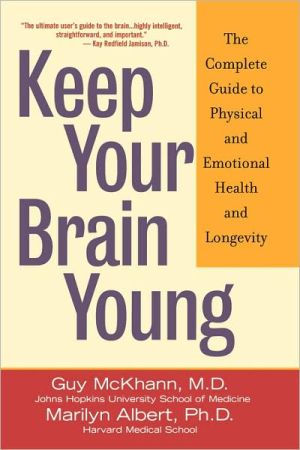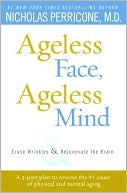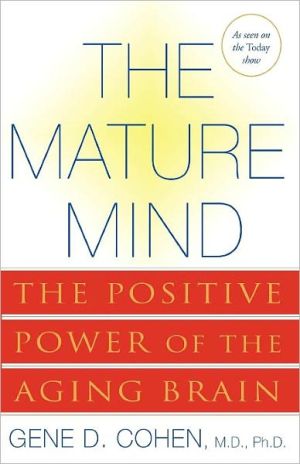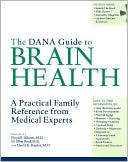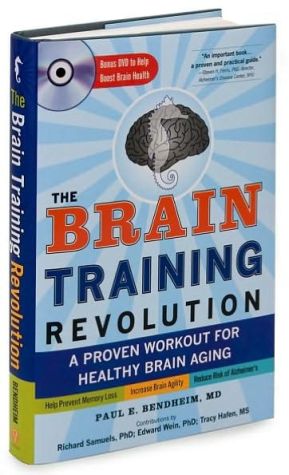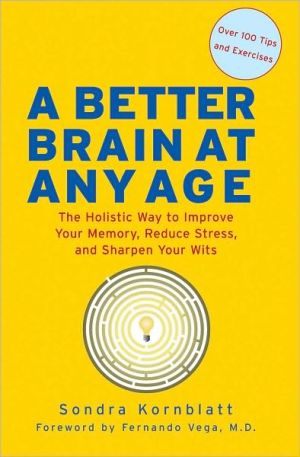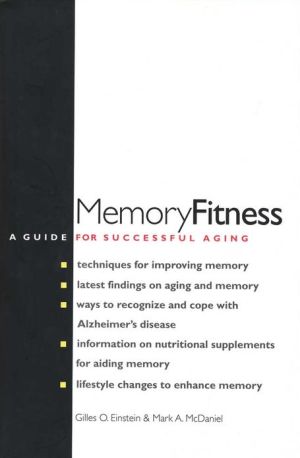Keep Your Brain Young: The Complete Guide to Physical and Emotional Health and Longevity
The ultimate user's guide to the brain...highly intelligent, straightforward, and important.\ —Kay Redfield Jamison, Ph.D.\ As Seen in Time magazine and on the Today Show\ "Guy McKhann and Marilyn Albert are to middle-aged people and seniors what Dr. Spock is to babies and their parents. Keep Your Brain Young is must reading for anyone over fifty; it should be on your bedside table."\ ——Judy Woodruff, CNN, and Al Hunt, The Wall Street Journal\ "I highly recommend this readable, informal, and...
Search in google:
If there is one thing that determines how fully you live at an older age, it is how well your brain works. Your brain controls and powers virtually every aspect of your life–from memory to moods, from thinking to sleeping, from movement to senses–and like the rest of your body, it changes with age. The good news is that now there is a single, reliable, comprehensive source with the information you need to keep your brain working at the highest possible level for the longest possible time.In Keep Your Brain Young, two of the world’s leading brain doctors guide you through the changes you may encounter as you get older and your brain matures. They calm your concerns about normal changes and show how to minimize them while enhancing your mental and physical functioning. You’ll learn what steps you can take to reduce the risk for serious diseases such as Alzheimer’s and Parkinson’s and how to recognize the symptoms of these diseases should they occur. You’ll learn about the brain-body link for other diseases, including heart disease and cancer. You’ll also find out about the rapid progress being made in the treatment of brain disorders.Based on state-of-the-art research and supplemented with dramatic case histories from the authors’ patient files, Keep Your Brain Young shows you the latest techniques you can use to maintain your memory, manage stress, and cope with sleep disorders. You’ll discover which foods provide the best nutrition for your brain and protect it from illness, how alcohol affects your brain, and how to recognize and cope with the symptoms of depression. Keep Your Brain Young includes prescriptive exercises you can put into action right away.Don’t let worries about senior moments interfere with your enjoyment of the second half of life. Read Keep Your Brain Young and gain the knowledge and confidence you need to manage the aging process, take care of your brain, and stay active and alert for many years to come. Publishers Weekly McKhann, a professor of neurology at John Hopkins, has coauthored this manual on the workings of the brain with his wife, Albert, director of gerontology research at Massachusetts General Hospital. Although the writing is dry, there is excellent information here for the aging adult. The authors acknowledge that growing older quite naturally involves some physical changes in the brain. They present the most effective ways, based on scientific research and case histories, to minimize these changes and their impact on everyday life. Strategies are offered to improve memory, such as doing mental exercises and maintaining a regular exercise program. For the disease-free older adult, the authors recommend a well-balanced diet and getting an adequate amount of sleep. They stress the importance of recognizing and seeking medical assistance for depression, hearing or vision loss and urinary and sexual problems. McKhann and Albert also deal extensively with a variety of brain disorders including tumors, Parkinson's Disease and Alzheimer's, and detail the latest medical treatments and drugs that may ameliorate some of these conditions. (May) Copyright 2002 Cahners Business Information.
Chapter One \ \ \ Maintaining Your Memory\ When Marilyn's mother, Carolyn, returned from vacation, she would always call her own mother, Rose, then in her 90s, and ask what had gone on in the world while she was away. Rose, who read the newspaper every day and watched the news on television every night, would bring Carolyn up to date on the details of recent world events. There was never any reason to check Rose's summary, because she always had things straight. As we write, Carolyn, now 87 herself, is currently reading the biography of a recent political figure, and as she retells some of the most interesting parts of the book, she expands the description on the basis of her own recollection of events.\ We think that Carolyn has an exceptional memory, but she doesn't think so. She regularly complains that her memory isn't what it used to be, and says that her biggest problem is coming up with names. At times she astounds us with the details of names and places from the past. At other times, a name that everyone knows will elude her. For example, we were recently talking about New York City, the city in which she was born and lived for most of her life. We were reminiscing about the political scene in the 1930s, and were surprised to see her struggle to come up with the name of the mayor at that time, La Guardia. She knew that he read the comics on the radio every Sunday morning and that the airport was named after him, but she could not come up with the name. A few minutes later, we were talking about something else and she suddenly laughed and said, "La Guardia—I knew that." This commonexperience is often called a "senior moment."\ These are not the memory complaints we see in our clinic, but we see them in our day-to-day lives all the time. Recently Marilyn was at a meeting with people who knew that she studied memory and aging. During the meeting, one of the men was having difficulty coming up with a name and looked nervously at Marilyn. She smiled and said, "That's normal—it happens to everyone." Everyone laughed, and appeared to relax.\ From experiences like these, and from speaking with numerous older people, both in our research and at large public meetings, we know that one of the things older people worry about the most is whether these "senior moments" are a sign of a more serious problem. Their concern is that this is the first sign of Alzheimer's disease. The publicity about this disorder emphasizes that the earliest symptom of illness is trouble with memory. However, normal changes take place in memory as we age, and these are not harbingers of disease.\ \ \ Memory Changes with Age\ In middle age many people start to notice that their memory seems to be slipping a bit. This is particularly true when they are tired or under stress. Naturally, they get worried that more serious troubles lie ahead. It is comforting to know that even as late as age 90, about one-third of both men and women can take in new information and recall it later every bit as well as they did when they were younger. For many of the other two-thirds, memory continues to function quite well. But that does not mean that there are not changes. The large majority of healthy older people can expect some changes in memory function, not limiting, but troubling to the individual experiencing them. These changes include taking longer to learn new things and having trouble remembering names and strings of numbers.\ Learning Slower But Well\ It takes longer for the average older person to take in new information and retain it. Actually, if it is a small amount of information, such as a phone number, then an older person will do just as well, if he or she is really paying attention. In contrast, with larger amounts of information, such as a set of directions to a new location or the story line of a new joke, an older person will typically require more time and more repetitions to remember these details accurately. But all the evidence indicates that if an older person takes the time to learn something well, he or she will remember it as accurately as someone many decades younger. Thus, although older people think they are forgetting things more easily, in fact, what is happening is that they are not learning them as well in the first place.\ Our friend Ellen is a good example of this. She decided to learn Tai Chi, the Chinese exercise ritual, at the same time that her grandson wanted to take lessons so they took them together. During the first few weeks, it became clear that her grandson was learning the formal motor movements at a much faster rate than his grandmother. At first she felt discouraged, but being a determined person she decided to persevere. As it happened, her grandson had to go back to school and was unable to continue taking lessons. Over the next few months, Ellen learned all of the Tai Chi movement routines that her grandson had learned so quickly. When the grandson returned from school, he was amazed at his grandmother's skill. As Ellen proudly explained, "It took me longer but once I learned them they stuck."\ Remembering Names\ The most common complaint of an older person with an otherwise good memory, like Marilyn's mother, is difficulty coming up with names. We all have some difficulty with this, and it does worsen, as we get older. For instance, you recall that such and such a fellow lives in a white house, drives a red car, and has a black dog, but no matter how hard you try you can't come up with his name. Some minutes later, while you are talking or thinking about something entirely different, the name suddenly comes to mind. As we mentioned above, this is normal.\ Names, in fact, are the most difficult things to remember, because they are entirely arbitrary. Mt. Everest could have been called Mt. Supreme, which would have made a lot more sense, but it isn't. The name Jack is an arbitrary label and two people with the same name may have very little in common—think of Jack Kennedy and Jack the Ripper. That's why a series of associations is the best way to help you recall the name. Remembering names takes work, and some people are better at it than others. Many of us, when we first meet a person, focus on who this person is and what he does—the actual name is of secondary interest. Not so for others, who immediately make the association of the name, face, distinctive job, or relation to other people they know. All these associations are linked to that person's name, making it that much easier to recall.\ Remembering Numbers\ Although older people most often complain about difficulty with names, if we dig beneath the surface, we find out that they also have difficulty recalling sequences of numbers. Like names, number sequences are arbitrary: Why should one number sequence represent your phone number and another the phone number of a close friend? Moreover, even if you learn these sequences well and use them frequently, occasionally you will draw a blank on the phone number of a friend or even your own. This phenomenon, like failing to coming up with a name, is normal.\ People with Exceptional Memories\ If you ask people who had exceptional memories when they were young if their memory is as good as it used to be, they usually say no, and they will be very specific about what they can no longer remember as well. For example, the physician who used to be able to read an article in a medical journal and tell you not only the contents of the article but also where certain things were on the page will regret that he can no longer do that. Likewise, the retired stockbroker who once could keep track of the daily changes in the prices of hundreds of stocks no longer feels able to do it. But it is not clear whether the physician's and broker's perception of their memory is correct; it may be that it takes daily practice to accomplish such feats, and perhaps, if they tried, they could still do it successfully. Although there have been many studies of memory changes with age, we actually do not know if people who had exceptional memory abilities when they were young maintain them, because the tests used to evaluate memory are too easy to present an effective challenge for these people.\ We know a retired lawyer, in her sixties, who said that in her youth she had had a photographic memory. She could read a page and remember exactly what was on it. During school, she didn't think she had to try to remember things, she just took them in by reading, and they stuck. A few years ago, after being retired for many years while raising a family, she decided to take a literature course at a university. The first night of studying, she had to read the same page 23 times to retain the information. Her photographic memory seemed to be gone. As she studied, trying to remember what she had read and wondering what had happened to her, the tears rolled down her face. However, two months later, after studying hard, paying attention as she read, her photographic memory was back. She is not sure it is as good as it was when she was younger, but she has clearly improved from the early days of taking that course.\ \ \ Different Kinds of Memories\ These stories make it sound as if memory is all one thing, but it is not. The problems that can occur with memory depend a lot on what type of memory you are talking about. The biggest difference in types of memories is between old memories and new memories.\ New Memories vs. Old Memories\ If someone learning something new is exposed to it only once, whether or not the information sticks will depend upon many factors. These include whether the new information is important, whether it is associated with something already familiar, and whether or not the person is paying attention.\ The part of the brain that is essential for learning and retaining new information is a small seahorse-shaped area called the hippocampal region (from the Greek hippocampus meaning "seahorse"). The hippocampus is involved when someone is actively learning something new. Once the information is well learned, however, it is actually stored in a different location, the part of the brain called the cerebral cortex. Thus, someone remembering things that happened many years ago is retrieving them from the cerebral cortex.\ Certain diseases of memory make this distinction very clear. In the early stage of Alzheimer's disease, where the damage is focused on the hippocampus, the difficulty is in making new memories, but old memories are preserved. An Alzheimer's patient at this point can remember past events quite well, but may be totally unable to learn anything new. In contrast, the disease in its late stages damages many parts of the cerebral cortex, and memories for past events are disrupted.\ Emotions also affect how well a person remembers things. Their impact is powerful in situations that are particularly pleasurable, dangerous, or upsetting, where vivid memories persist for years or sometimes even a lifetime. For example, those of us who are old enough can remember precisely what we were doing when we first heard that President Kennedy had been shot—where we were, who we were talking to, maybe even what we were wearing. The same phenomenon will occur in relation to the attack on the World Trade Center. Memories of events with particular emotional or historical importance are also likely to be well entrenched because you think about them many times, reinforcing their memory circuits in the cerebral cortex.\ Memory for Skills and Memory for Facts\ Memories for skills are stored differently in the brain than are memories for facts. Riding a bicycle, hitting a golf ball, or dancing, are skills that, once learned well, are with us even after long intervals. These skills can be preserved in people who have difficulty learning new facts. A patient of ours has a memory problem that makes it impossible for him to continue to practice law, but he can and does play golf quite well, three or four times a week. However, he cannot fill out his scorecard or keep score for others; someone else has to do that. The current thinking is that memory for skills such as the motor acts required to play golf or tennis are stored throughout the brain, in areas different from memory for specific details that keep changing such as the score or even the names of who is playing.\ \ \ How Your Brain Forms Memories\ Can you drive your brain to be better than it is genetically programmed to be? Little evidence supports the possibility. However, it is clear that you can attain optimal functioning and maintain it by stimulating usage. Each nerve cell communicates with thousands of others. But when you form new memories, you strengthen a particular series of connections, the way a heavily trodden pathway in the woods becomes more visible and easier to follow. Among nerve cells, two different things are happening. First, changes take place in the physical connections between nerve cells to make one pathway easier to use than others. These changes occur at the very end of the pathway, at the synapses, where nerve cells connect with one another. Second, some of the chemicals released at the synapses, the neurotransmitters, are specialized for memory. One of these neurotransmitters is acetylcholine. As we will discuss, many of the drugs being developed to attempt to modify memory involve increasing the effectiveness of this neurotransmitter.\ Mentally and physically stimulating activities promote this constant "rewiring" of the brain, strengthening its pathways and stimulating the production of substances required for the growth and maintenance of nerve cells. In some instances, brain cells will make new connections. More commonly the balance between existing connections is altered, by strengthening some and weakening others.\ Years ago scientists thought of the brain as being "hard-wired," meaning that during development, nerve cells would assume their proper positions and make myriad interconnections. Once in place and interconnected, it was thought that nerve cells did not change. This notion is clearly wrong. Research in the last few years has shown that new nerve cells may even develop in areas of the adult brain, including the hippocampus, the area that is important for making new memories. No one knows what regulates this replenishment of nerve cells, but recent evidence suggests that one factor may be physical and mental activity.\ Genetics of Memory\ Genetics also plays a role in how well memory functions. The behavior of animals is a good example. Certain breeds of dog, such as Labradors, are supposed to be gentle but perhaps a little dumb, meaning they do not learn new information easily. German Shepherds, on the other hand, generally learn quickly but are not particularly gentle. The same phenomenon is well known in laboratory animals. Some strains of mice can be taught to find food in a maze much more easily than others. Now that we know that genes can be either more or less active, it is possible to breed mice that are selectively smart or dumb. This line of research is one of the approaches that may eventually lead to drugs that will enhance memory for people.\ But what about us humans? Everybody knows of families in which multiple members live into old age, preserving their intellectual abilities to a remarkable degree. Is this all related to lifestyle, or are genetic factors involved? Are different individuals genetically endowed to preserve mental functions and others not? Although we do not know the answer to that question, two possibilities seem likely. Some people may simply not have genetic vulnerabilities that lead to diseases like Alzheimer's disease. On the other hand, they may have other genes working that protect their brains from the decline in the abilities of nerve cells to function normally. Research to explore these alternatives is already under way in animals, such as mice, in which the genetic properties can be manipulated.\ \ \ Improve Your Memory\ You can use specific memory training techniques to make your memory better on a daily basis. You can improve your ability to take in new information and retain it by concentrating and adding structure, putting the new information within frameworks you already know or already use. Another strategy is to associate the new information with existing knowledge that is meaningful to you.\ (Continues...)\ \ \ Excerpted from Keep Your Brain Young by Guy McKhann, M.D. Marilyn Albert, Ph.D.. Copyright © 2002 by Guy McKhann and Marilyn Albert. Excerpted by permission. All rights reserved. No part of this excerpt may be reproduced or reprinted without permission in writing from the publisher. \ \ \ \
AcknowledgmentsviiPart 1The Brain and Everyday ConcernsIntroduction: Healthy But Realistic in the Second Half21Maintaining Your Memory62Nutrition for the Brain: Food, Fuel, and Protection243Sleep and the Brain394Managing Stress535Unmasking Depression616Alcohol and Your Brain74Part 2The Brain and Your Body7Pain and Your Brain828Body Functions and Your Brain1079Protecting Your Senses11910How to Keep Your Balance--Literally13211Fainting, Dizziness, and Your Brain141Part 3The Brain and Preventing and Treating Serious Problems12Understanding Acute Memory Loss14813Acute Confusion and How to Prevent It15614Dealing with Alzheimer's Disease and Other Dementias16515Treatable Dementias18816Cancer and the Brain19817New Options for Parkinson's Disease20918Shaking, Weakness, ALS, and Your Brain23419Stroke: The Brain-Heart Connection24620Taking Charge of Your Brain270Appendix279Index289
\ Publishers WeeklyMcKhann, a professor of neurology at John Hopkins, has coauthored this manual on the workings of the brain with his wife, Albert, director of gerontology research at Massachusetts General Hospital. Although the writing is dry, there is excellent information here for the aging adult. The authors acknowledge that growing older quite naturally involves some physical changes in the brain. They present the most effective ways, based on scientific research and case histories, to minimize these changes and their impact on everyday life. Strategies are offered to improve memory, such as doing mental exercises and maintaining a regular exercise program. For the disease-free older adult, the authors recommend a well-balanced diet and getting an adequate amount of sleep. They stress the importance of recognizing and seeking medical assistance for depression, hearing or vision loss and urinary and sexual problems. McKhann and Albert also deal extensively with a variety of brain disorders including tumors, Parkinson's Disease and Alzheimer's, and detail the latest medical treatments and drugs that may ameliorate some of these conditions. (May) Copyright 2002 Cahners Business Information.\ \
